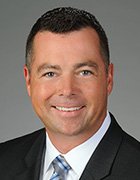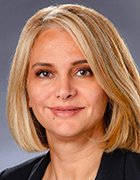
Sergey Nivens - Fotolia
CIO's breadth, depth, business savvy on display at Trace3 Evolve
Technology leaders from NetApp, First American and Experian were among those honored at the Trace3 Evolve event. Their outsized role in driving business value was on full display.
Bill Miller is CIO at NetApp, but he also serves as the data storage firm's de facto chief customer experience officer. His IT organization is "customer one" at NetApp, Miller said, offering feedback on products to the engineering teams and working closely with the company's customers to help them maximize their investments.
Morgan Reed is CIO for the state of Arizona, but the moniker chief digital transformation officer certainly describes the role he's played in modernizing the state's decades-old IT systems. Since taking on the job in 2015, Reed has applied his career experience at the likes of Intel and Expedia to develop an IT culture where bureaucracy takes a back seat to innovation.
Shabnam Jalakian is CISO at First American Financial Corp., but the former Deloitte consultant sees herself as the $5.8 billion company's top business technologist. Her 150-person security team takes a risk-based approach to security. Not all assets and data are equal, she said: "We apply the most amount of security where it counts the most … so security never ever slows down the business."
Miller, Reed and Jalakian were among the seven technology leaders honored at the Trace3 Evolve Technology Conference in Las Vegas, an IT and leadership event hosted by Trace3 Inc., an IT solutions provider based in Irvine, Calif. The vendor's Outlier Award is given to "individuals who consistently deliver dynamic innovation and outstanding leadership."
As one of the judges for the Outlier Awards at this year's Trace3 Evolve event in May, I had the opportunity to review the nominations and interview the finalists, a high octane and diverse group notable for the depth and breadth of their jobs. They possessed the technology chops companies need from IT execs -- many of them are implementing cutting-edge applications -- but these technology leaders also stood out for their industry knowledge and vision of how technology fulfills the business mission.
Reinventing the U.S. payment system
 Keith Melton
Keith Melton
Case in point is Trace3 Outlier nominee Keith Melton, senior vice president and chief strategy officer at the Federal Reserve Bank of Atlanta in its Retail Payments Office. Melton's job is to help modernize the U.S. payment system, a mission he is singularly prepared to do. With 20 years of experience in the financial services industry, including as vice president at Atlanta's SunTrust Bank, Melton came to the Fed from IBM where he actually helped build the platform the Fed is using to transform payments processing.
Speeding up the payment world can't be done without an understanding of the effect that has on other critical elements of the banking process, Melton said. Banks, for example, must be able to detect fraud, but if payments speed up, the window for deciding whether the transaction is good or bad also narrows. "So, all the ancillary systems that touch the payment system are also being modernized," he explained.
Outlier candidates were asked to talk about their technology leadership styles during the judging process. One of the differences about working at the Fed that has made a deep impression on Melton is the institution's collaborative leadership style.
"Not to say that IBM and others haven't been very collaborative, but a lot of decisions in the Fed are also made by consensus," he said. That entails working with other governance groups, other districts and many leaders. "It's a little bit of a different style than what I'm used to, but it's actually opened my eyes to … other ways of accomplishing common goals."
Digitally transforming a ship of state
 Morgan Reed
Morgan Reed
For Reed, the Outlier Award winner at Trace3 Evolve, the move from the private sector to the public sector gave him an opportunity to lead on a different scale.
"I made progress at my previous companies, but I moved the needle in small increments -- from 85 to 90," Reed said of his work at Intel, Expedia and GoDaddy. "At the state, we were going to have the change to go from 30 to 90 -- to make monumental strides. I could see potential to really transform Arizona government to be a leader in technology."
Three years into his tenure, progress includes a new state-of-the-art, cloud-based data center and the ongoing standardization of IT services over 130 state government agencies -- many of which had their own CIOs and idiosyncratic IT systems. "I had to quickly partner with agency IT leaders and determine the best plan of action to make the largest impact," Reed said. The work entailed establishing enterprise contracts that would save taxpayer money and could support statewide IT transformation.
The mile-a-minute push to modernize, while exciting, has not been without challenges. Some people who felt threatened by the changes wanted him fired, Reed shared. But he said the impact IT is making on constituents' lives in areas such as education, health and public safety, keeps him motivated. "Seeing the tangible benefits IT has on the state I call home -- that was what attracted me the position … and I've been happy ever since." With many of the fundamentals addressed, Reed said his IT organization is pushing into cutting-edge territory, using machine learning and big data to drive more innovation.
CIO as chief customer experience guru at Trace3 Evolve
Dan Morales and NetApp's Miller work in very different industries, but they have each made a mark in an emerging area of responsibility for leading IT executives: improving the experience of customers -- internal and external.
 Bill Miller
Bill Miller
Miller, who joined NetApp in 2016 after four years as CIO at Broadcom, relishes his job as "sales evangelist" for NetApp. "While we have several thousand engineers at NetApp, we really only have one set of operators of that technology, and that's the IT department," he said. The firsthand feedback Miller's team gives to NetApp engineers helps them improve the product. IT's experience with using the technology -- and Miller's willingness to meet with and help NetApp customers -- accrues to the vendor's bottom line. The role comes naturally to Miller. A trained engineer, he said technology for technology's sake never cut it for him. "I've always been interested in applying technology and seeing how you make thing work better, faster and improve the world through technology," he said.
 Dan Morales
Dan Morales
Morales, who was named CIO at Universal Music Group in April, was nominated for his work as CIO at eBay, a position he assumed in 2015 just as the online marketplace split from PayPal. "We had about 350 systems supporting corporate eBay" that were tightly integrated with PayPal and needed to be spun off, he recalled. "It was super-fast, probably the hardest project of my life." The feat was pulled off not by radical technology transformation, Morales said, but by focusing first on simplicity -- from an end-customer's perspective.
"When you take a company the size of eBay, making it simple doesn't always mean I have to take 350 applications and make it 100. Essentially, we've done it by building platforms. We front end pretty much everything out there," he said. "We just bring front and center what users need to do their job right from their mobile phone."
One of the user "speedbumps" Morales addressed before leaving eBay was security. He spearheaded a project that created an "algorithmic people print" through eBay-issued mobile phones, enabling employees to badgelessly move from the parking lot to authentication on the network.
IoT at the edge, pivoting to the cloud: Be bold
 Dan Brennan
Dan Brennan
Anticipating the next big thing in IT is the difference between success and failure as a technology leader, according to Trace3 Outlier nominee Dan Brennan, vice president and global head of strategy, marketing and operations at Baker Hughes, a GE company. Predict well, and the bold move pays off. Miss too many times, and the results can get ugly.
Trained as an engineer, Brennan said his interest in the business impact of IT was present since he joined GE nearly 20 years ago and reinforced by a mid-career MBA. The degree coincided with GE's push into software and led to a leadership role in marketing for Brennan. "It was kind of an entrepreneurship role" that involved partnering with GE's research arm and looking for cutting-edge solutions to customer problems, he said. Today, Brennan is helping to drive Baker Hughes' foray into the emerging field of industrial IoT. The aim is to use the massive data ingested from equipment at the edge to optimize the complex processes of Baker Hughes customers.
 Joe Manna
Joe Manna
Joe Manna, chief product officer and CTO at Experian Consumer Services (and self-described "hacker at heart"), also operates on technology's frontier. He was recruited by the consumer credit reporting company in 2015 from a CTO position at Live Nation Entertainment to help rejuvenate its product portfolio.
"We needed to transform the platform we were on. So, we made a complete pivot out of an on-prem .Net sort of client server, old school architecture to microservices in Amazon," Manna said.
The right leadership proved critical to getting the job done. Manna said he brought in people who had strong technical skills and the emotional IQ to get people "on board with the mission and vision of what the future could look like," he said.
Nurturing IT talent, building culture of creativity
The IT leader's ability to bring people along was called out by every one of the seven Outlier nominees as a must-have technology leadership attribute. In their nominating documents and in person, the Outlier candidates talked about their leadership philosophies for developing IT talent. Empowering people and getting out of the way, was a common theme. Transparency and accountability are important.
NetApp's Miller said he demands a great deal from his staff, but he does so with the carrot rather than the stick, seeing his role as "part cheerleader and roadblock remover."
 Shabnam Jalakian
Shabnam Jalakian
First American's Jalakian has an open-door policy with her team. "I'm very approachable … I'm very open," she said. Real-time feedback is important. "My motto is, I don't want anyone to ever be surprised that they're not meeting expectations," she said.
A little moxie doesn't hurt either, according to Manna, when building a high-performance team.
"We create an atmosphere that feels a little renegade, rogue, yet entrepreneurial. We have an identity, so, therefore, we have self-esteem," Manna said. "We want to feel like we're doing a good job. We want to be recognized for that."







